Wellness influencers are coming for our coffee.
Nothing new, exactly. Coffee’s an easy target given its global prevalence.
To some, coffee represents peak capitalism, the “happicuppa” (as Margaret Atwood framed an exploitative coffee bean owned by a massive corporation that put local farmers out of business) that keeps workers churning along at peak productivity.
For others, supermarket and third wave coffee are all infected with mold toxins that wreak havoc in our microbiomes. Microplastic-ridden packaging destroys guts and oceans. (As with many wellness claims, this reveals a tough truth, though, as we’ll see below, the “solution” exacerbates the same problem.)
Coffee is an ideal product to grift. While exact numbers are difficult to pin down (given that a lot of statistics come from the coffee industry), between two-thirds and ninety percent of Americans drink coffee on a daily or weekly basis. Demonizing such an impactful bean comes easy for people trying to sell alternatives.
Since launching Conspirituality, I’ve used a simple heuristic to identify wellness grifters:
Watch what they say, then watch what they sell.
If an influencer criticizes vaccines, then sells “immune-boosting” supplements, an immediate red flag should be raised.
Conspirituality is the study, in part, of left- and right-wing crossover. A heuristic applicable to authoritarians also fits:
Market fear. Sell solutions.
Trump’s formula when screaming retribution, for example. Given his poll numbers in the GOP race, it works. He didn’t invent the playbook, but he’s certainly mastering it.
Many wellness influencers read from this playbook, to varying levels of success. They know their target audience. Coffee has addictive qualities, and some people consume too much, which negatively impacts their health. Yet the majority of Americans—even those dependent on coffee, a category I place myself in—can enjoy a daily cup or two and experience health benefits.
Influencers home in on those looking to quit, reduce their consumption, or desire a more “natural” lifestyle. The influencers deploy anecdotes about feeling better, glowing skin, newfound boundless energy. I’m not denying their experience. The problem is extrapolating from anecdote and applying it broadly.
Moderation is absent from the wellness playbook, as it projects mental weakness. A binary must be drawn, and so they fetishize abstinence as a moral virtue. Anything less would be giving into the forces of the status quo, a fate worse than death.
Once coffee is framed as bad, the sales pitch arrives. They pitch a different kind of coffee, a coffee “alternative,” an unrelated “energy-boosting” product. A few examples follow.
These influencers inform their followers that coffee is part of a health-destroying agenda, and they, the benevolent influencer who’s really looking out for you, swoops in with true health advice.
Which is going to cost you.
Shot in the dark (roast)
In his book, The Bulletproof Diet, Dave Asprey devotes an entire chapter to “coffee mold.” He’s referring to mycotoxins, which are harmful to humans—in doses far beyond what you’ll consume in an average cup of java.
The most common mycotoxins in coffee are Ochratoxin A (OTA) and aflatoxins. The acceptable dose load of OTA in humans has not been determined by the FDA, but the European Food Safety Authority (EFSA) set the tolerable limit at 120 nanograms per kilogram of body weight. The measured intake of the average American is between 15-60 nanograms, which counts for all food and environmental intake, putting coffee well within at least one regulated range.
Aflatoxins are known carcinogens. The FDA set an acceptable level in food at 20 parts per billion (ppb) in the “foods” category.
Considering harvesting regulations and roasting methods, the likelihood that mycotoxins in coffee are an issue is minimal. Yet Asprey claimed most of the world’s coffee supply was subject to mycotoxins, which is causing grave danger to our health.
His solution? “Mycotoxin-free” Bulletproof coffee. Naturally.
Shrooms are not coffee
My wife recently shared a clip from Mari Llewellyn’s podcast. Llewellyn lost 90 pounds over two years and documented her journey on social media. According to my wife, her content was predominantly a blend of weightlifting and weight loss videos alongside general lifestyle tips.
At some point, Llewellyn apparently turned deep into wellness pseudoscience. Perhaps sponsors played a role. The aforementioned clip is from a recent podcast with “Nutritional Therapy and Integrative Health Practitioner,” Emily Morrow, and features the following products with affiliate links.
Needing a new vocabulary to decipher wellness-speak is not uncommon. As with any niche community, coded language puts you in the “in” crowd.
Some of these products are in Morrow’s downline. Her biography is a trip. Another way to spot red flags is to read an influencer’s about page. If they don’t state their medical or science training in the first paragraph (or at all), you can be pretty certain they’re either making up their title or are leaning on questionable certifications.
Trained science professionals list credentials front and center so that you can quickly assess their validity. Whereas in wellness spaces, seeing “certified hormone specialist” (as another one of Llewellyn’s recent guests claimed) forces you to search for the source of the credential (which I did), and it almost always leads back to an influencer-led coaching-style course (which this one is).
Llewellyn originally cited Morrow as her “doctor” but has since amended the show notes. She was demoted to “guardian angel.” Perhaps this is an upgrade in Morrow’s eyes. Here’s a paragraph from her professional bio.
Though physical healing is not always promised on this side of heaven, we can still choose to pursue optimal wellness by making healthier food choices, prioritizing sleep, getting sunshine, consuming mineral rich clean water, balancing blood sugar, optimizing digestion, getting routine labs done, laying down perfectionism, addressing toxins and pathogenic overgrowth, cleaning up products in the home, honoring and sifting through emotions and pursuing the abundant life Jesus came to give us.
A whole lot of wellness buzzwords wrapped in a cloak of Christianity. I take no issue with religious devotion. When faith serves as the guiding light for who gets to be healthy, which is ultimately where the relationship between wellness and religion leads, criticism is necessary.
In the opening moment of the clip, Morrow demonizes “coffee shop coffee.” She then promotes a mushroom coffee multi-level marketing (MLM) company, Organo.
Wellness critic Mallory DeMille noticed something: Morrow demonizes coffee and microplastics during the episode. DeMille then looked into Organo’s packaging. She even messaged the company directly.
Polyethylene. The most-used consumer plastic.
Polythene. Another name for polyethylene.
Polypropylene. The second most widely used consumer plastic.
Polyester. More plastic.
Market fear. Sell back the exact thing you just told people to fear.
This would all be funny if it weren’t so predictable.
Pill pushers
Asprey and Morrow are not alone in their coffee alternative, “cleaner energy” sales pitches.
Luke Storey, an influencer with more products on his downline than anyone I’ve ever come across, belittles caffeine to sell you on liquid ketones. He also sells kava drinks and capsules, elk antler, and a $144 nootropic with the following health claims and zero links to clinical studies supporting these claims.
Higher evoked neural potential - literally more power in your brain
Decrease in neural Inflammation
Removal of plaques and protein
Stimulation of the glymphatic system
Neurogenesis - new neurons
Then there’s Christian Van Camp, a fitness coach who promotes “natural” living. He posts about topics like not wearing t-shirts because they restrict movement and imploring his followers to avoid sunscreen. They’re often presented as a litany.
Notice he doesn’t demonize coffee, but does promote organic coffee. If you’re wondering if there’s organic coffee in his downline…
As with Asprey, Morrow, and Storey, Van Camp is part of a wave of wellness influencers who constantly demonize modern life. While we certainly have problems with microplastics, food economics, and supply chains, food availability is greater now than ever before.
In order to monetize followers, influencers need to constantly create fear around products in order to sell you something similar—usually more expensive, rarely as effective, but similar.
Coffee is moldy. Buy my mold-free beans. Or my organic coffee. Or mushroom coffee.
(To each their own. I tried mushroom coffee in good faith a few times. The answer remains no.)
Coffee is only one example of an ever-growing list of toxic products and foods, and their purported solutions. The pattern repeats in the wellness emporium ad infinitum.
The wellness heuristic, revealed:
Reject modernity’s bounties to invest in…a more expensive (and often less reliable) version of modernity’s bounties.
You can come for my coffee, but you’ll have to pry it out of my warm, happy hands.


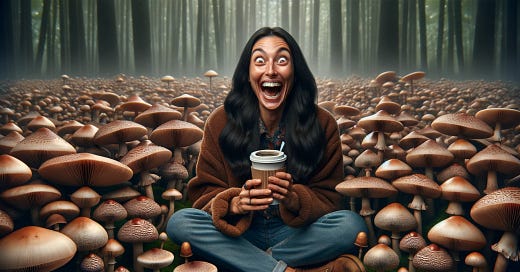





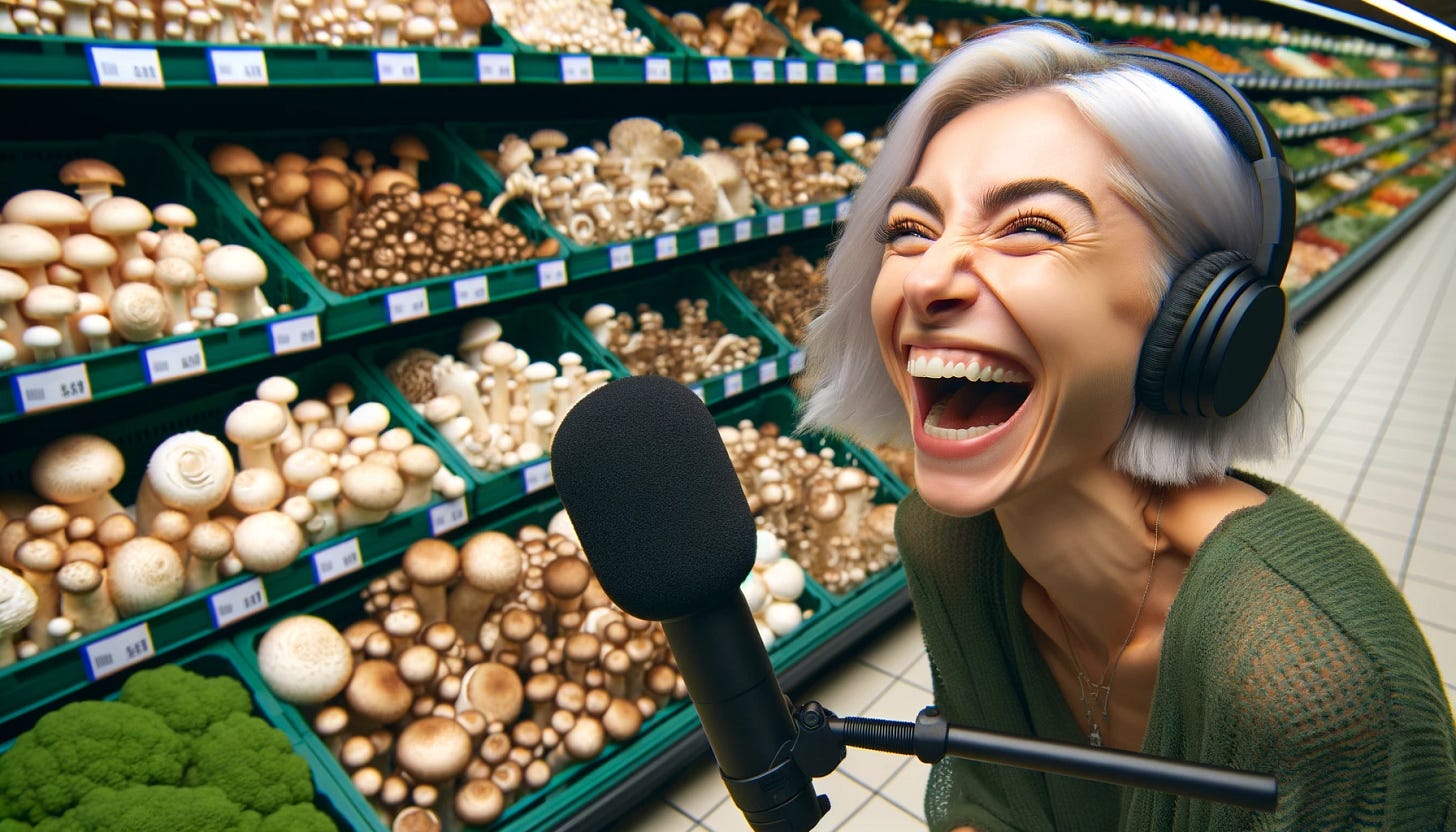

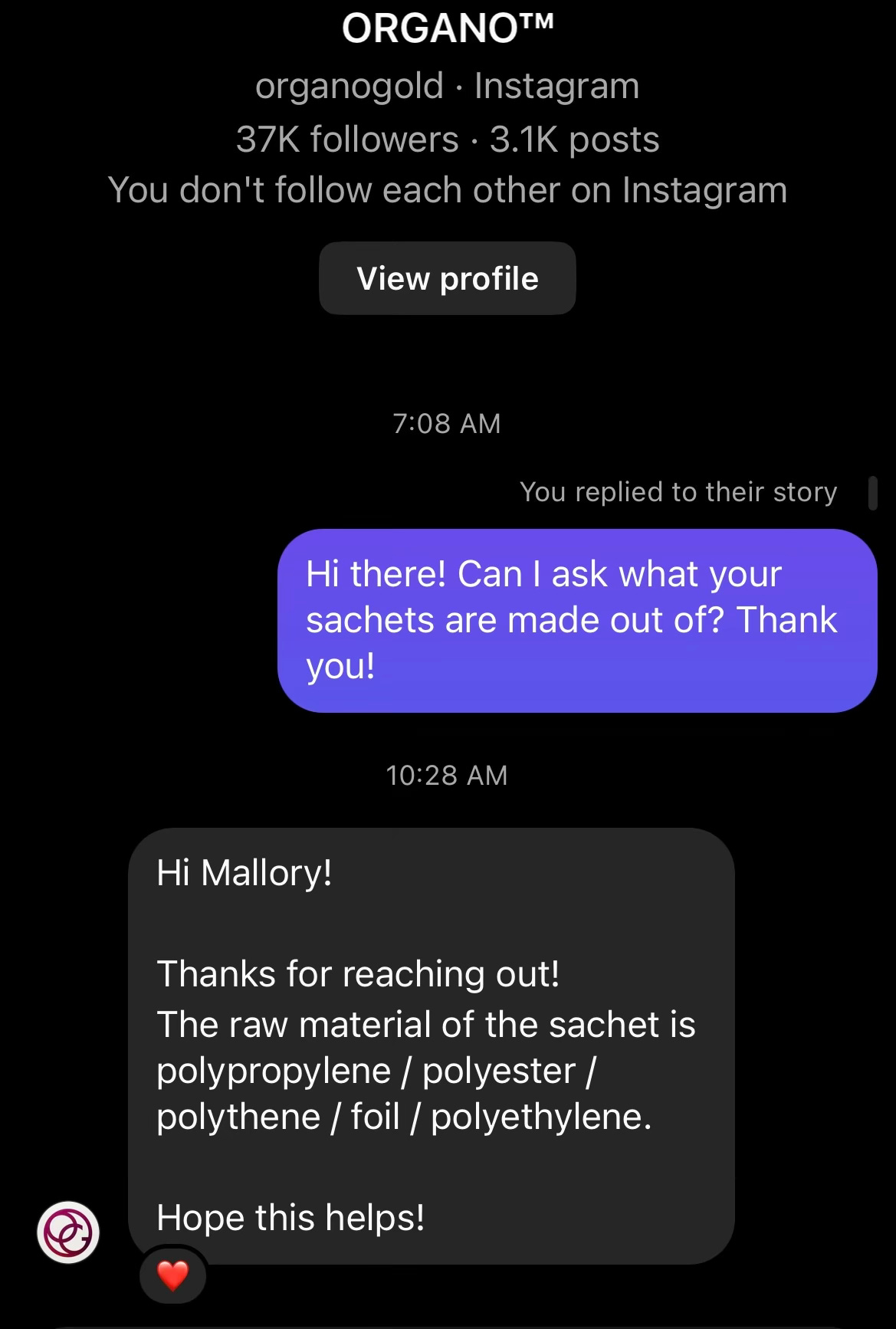
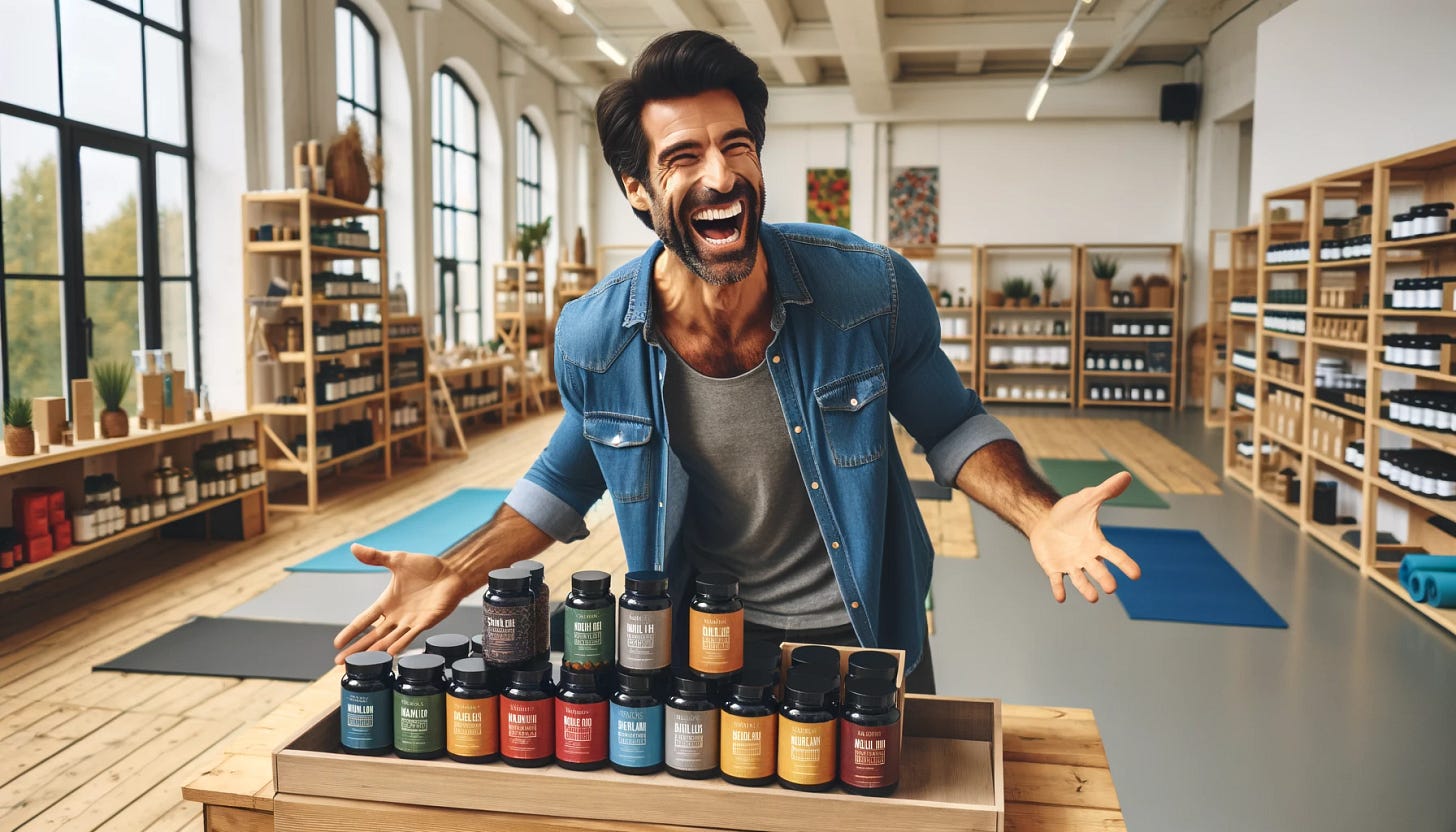
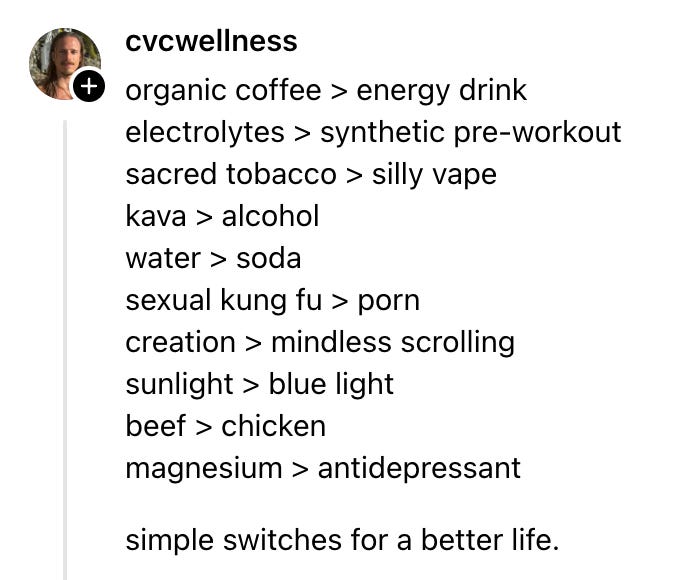

I appreciate the work of Conspirituality as always. Thanks, Derek.
great post! as a longtime yoga teacher and yoga therapist I've long felt it was unethical to sell products to my students (having tried it at the beginning of my career and stopped because it just felt creepy)